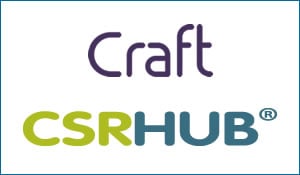The following post is part of a CSRHub series focusing on 10 trends that are driving corporate transparency and disclosure in the coming year. To follow the discussion of each trend, watch for posts on the CSRHub blog every Wednesday.
By Karen Dam
Do you want to work for a socially responsible company? Do you care if your employer’s social and environmental performance is consistent with your values? Insisting on a job that respects your moral commitments as well as your paycheck is a prominent trend in today’s workforce, especially with younger workers. As companies assess the challenges and benefits of effective sustainability and/or CSR efforts, employee preference, retention, and engagement is an increasingly important element.
According to a 2011 PriceWaterhouseCoopers (PwC) study, 88 percent of graduate students and young professionals factor an employer’s CSR position into their job decision. And 86 percent would consider leaving a job if their employer’s CSR performance no longer held up.
Similarly, the 2010 Corporate Social Responsibility Branding Survey revealed that almost half of respondents between the ages of 18 to 24 would choose a position with a socially responsible company, even if they had to take a pay cut.
People simply want to work in a good company – a company they can believe in. Apparently, when employees believe in their employer’s stance on important social and environmental issues, a study by Hewitt Associates’ 2010 Best Employers in Canada showed that employees are more engaged.
A highly engaged workforce gives you employees who are committed to your vision and your success. It also gets you employees who fight to get in your door and who want to stay. It means higher productivity, ingenuity, and innovation – all of which drive business growth and profitability. In fact, companies with high levels of employee engagement generate total shareholder returns that are 29 percent above average, while companies with moderate levels of engagement produce returns that are only 1 percent above average (Hewitt Associates study).
Business leaders are well aware of these benefits. “Higher or sustained employee engagement” is ranked as one of the top three benefits of investing in CSR activities and policies (Hewitt Associates study). That may be why companies with well-established employee engagement programs such as those at Adobe Systems, Enbridge, and the Campbell Soup Company, also rank relatively well on CSRHub.
Of course, a business must be able to track employee engagement to measure and promote its benefits. Fortunately, new tools are being introduced that do this. For instance, Gallup’s employee survey helps organizations measure engagement levels, as well as design and implement employee engagement strategies. Happiily’s app tracks and anonymously aggregates employee reactions and morale, so that managers can address employee dissatisfaction in real time. AngelPoints’ integrated sustainability tool motivates and educates employees to set goals and track their progress in the workplace and at home.
A company may benefit from a committed and engaged workforce not just on key business metrics, but also in its longer-term reputation as an employer. A strong track record of employee engagement and CSR not only retains the most committed talent, but also entices new recruits. That is why at CSRHub we have incorporated “best places to work” lists, such as Glassdoor.com Top 50 Best Places To Work, Computer World 100 Best Places to Work in IT, and Working Multicultural Women 2011, into our ratings.
A company’s ranking as a top employer and caretaker of its employees is an important part of the umbrella of social benefits they provide their workers. Employees are powerful drivers of a company’s CSR performance. This power will likely increase as the highly engaged workforce of tomorrow comes of age and demands its companies to be CSR leaders.
Karen Dam is a data analyst at CSRHub. Karen completed her Bachelor of Science in Environmental Sciences at the University of Guelph, and a Master of Environmental Science at the University of Toronto Scarborough. She has enthusiastically filled research roles in the public sector. Karen has experiences in project management and research, including data collection and data management, analysis and synthesis. Karen actively volunteers with NGOs, including conservation authorities, to contribute to ecosystem protection, advocate environmental sustainability and of science literacy. Her hobbies include cycling, reading, and painting.


